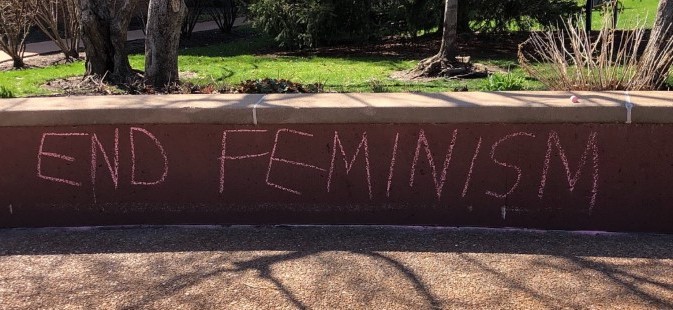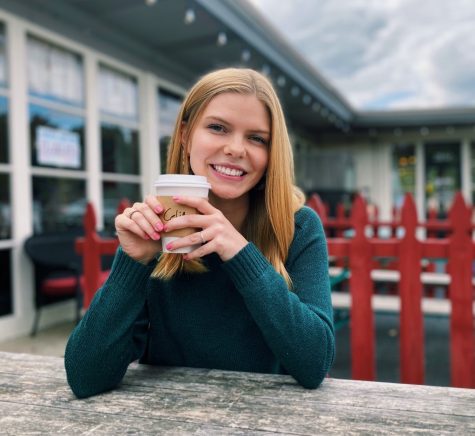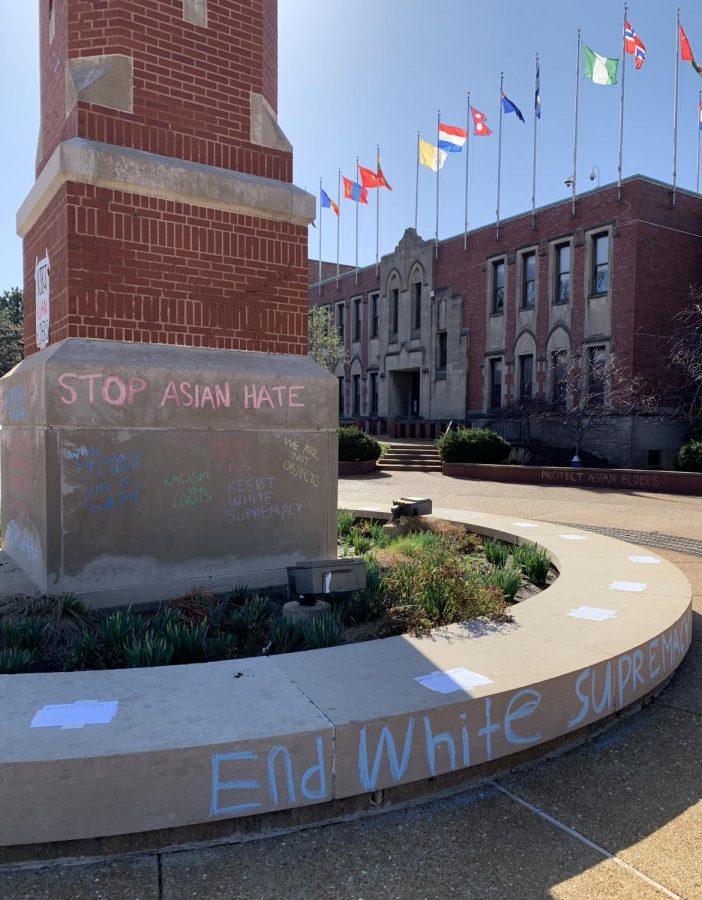Stop the Hate Vigil Calls for Change
The Cross Cultural Center hosted a Stop the Hate vigil Friday, March 19 to honor the lives lost in the anti-Asian mass shootings days before and to raise awareness to the 150 percent surge in anti-Asian hate crimes since 2019.
Soi Lee, a junior at SLU, woke up Thursday morning too upset to make it to class. It was March 18—the heart of midterms and two days after a white male shot up three different Asian spas in the Atlanta area, killing eight people, six of whom were Asian women.
“We couldn’t even focus,” Lee said. “We couldn’t even go to school. We couldn’t even live our normal lives.”
Lee is Korean, and her roommate, junior Abby Kwon, is Korean-American. They found a small comfort in talking with each other in the days following the shootings, but mostly needed time alone to process the events. Later that day, though, they were already helping Luella Loseille, the program coordinator for the Cross Cultural Center at SLU, organize a virtual Stop the Hate Vigil, held Friday, March 19. It’s goal was to commemorate the lives lost in the mass shootings and to address the wider problem of anti-Asian sentiment that has grown in the United States over the past couple years, focusing on what can be done about it.
Earlier in the day on Friday, Lee and Kwon gathered with friends and fellow students in the quad, bringing armfuls of chalk and posters to create a make-shift shrine and call-to-action. Phrases like: “Stop Asian Hate,” “Racism is the virus,” “Learn how to say our names” were written along the clock tower.
One unidentified person, however, wrote “End Feminism” along a bordering wall in broad daylight. Because the security cameras around the clock tower haven’t been working for some time, the individual has yet to be held responsible. This sparked a fire in Kwon, and gave her the courage to speak out at the vigil consisting of around 200 participants.

“I’m not usually a person who likes to public speak,” Kwon said. “At the vigil, I was just so heated, and I felt so compelled to speak up, where it didn’t really make me nervous. I had to say what was on my mind”…“I’ve never felt like that before.”
Kwon believes the message echoed a misogyny that was showcased in the spa shootings, as the shooter claimed to have targeted the spas to eliminate his sexual “temptation,” according to the New York Times.
“There’s a lot of misogyny and racism that we need to combat in our own communities,” Kwon said. “It affects us a lot closer than we think it does.”
Both Kwon and Lee were studying abroad in spring 2020, when the coronavirus first impacted our lives. Kwon was in London and Lee was in Denmark, and both said they had experienced radical, racial wake-up calls in their time in Europe—before the outbreak of COVID-19, and after.
Kwon remembered one night, specifically, where she was travelling on a bus in London, and a white man called her a slur, along with making many racially-charged sexual remarks.
“Everyone thinks of study abroad as a great experience; you get to travel the world,” Kwon said. “But as a person of color, you have to think about how other people in that country are going to perceive you, and you’re not safe from racism.”
She had another similar experience in Barcelona. And then again in Scotland. They were different from each other, but all preyed on the fact that she was a young, Asian-American woman. SLU’s study abroad team hadn’t prepared either of them for these experiences.
When the coronavirus became more prevalent, and the two were sent back to the States, the racist remarks picked up and packed more aggression as the culture of anti-Asian hate became normalized. Lee and Kwon both had countless stories of times people made vehement associations between their race and the virus.
“One time during the lockdown, me and my friend went on a walk, and these two white men yelled at me and told me to go back to China,” Lee said. “It’s just like, you don’t even know me. How could you say things like that?”
Kwon believes this blatant racism was made more mainstream when the news outlets were focusing on Wuhan, China as the epicenter of the disease, especially when former president Trump’s language about the virus was derogatory to Asians. Many people interpreted this knowledge to mean that China was responsible for the outbreak, which progressed into harmful stereotypes of Asian people, specifically surrounding their food and culture.
“We’re still seeing the effects of it now, a year later,” Kwon said.
As of this year, 11.4 percent of SLU’s undergraduate student body are Asian. It is a dismal statistic next to the 64.3 percent who are white, but it is still the second most common ethnicity at our university. Yet, APIDA students are feeling unheard.
Kwon said that in order to move forward, SLU must realize how much they’ve benefited off of systemic racism and white supremacy, and find even the smallest ways to dismantle that.
“The demands that we listed are good steps,” Kwon said. “I don’t think it’ll fix the damage that is already done, but it’s honestly the least that they could do.”
Lee agrees, emphasizing a need for accountability. For the person who defaced the clock tower’s memorial. For SLU, itself.
“I really hope they know that we’re here,” Lee said.
Lee and Kwon let out a light laugh and then a deep sigh.
“Yeah,” Kwon agreed.
Your donation will support the student journalists of Saint Louis University.





